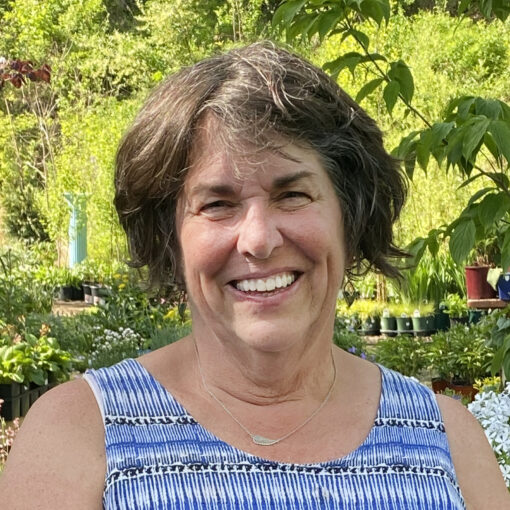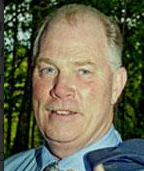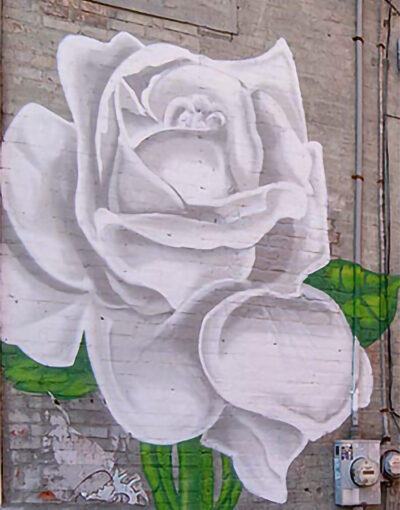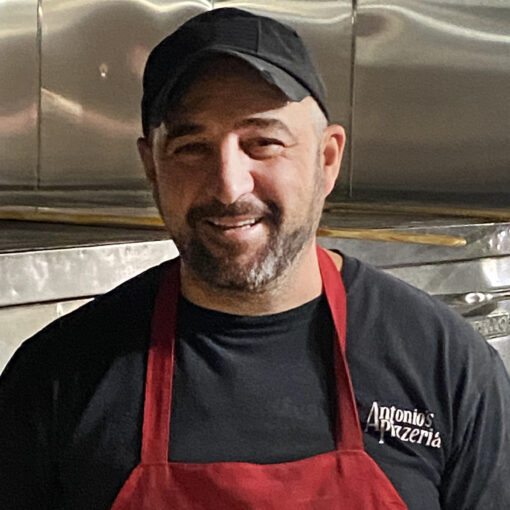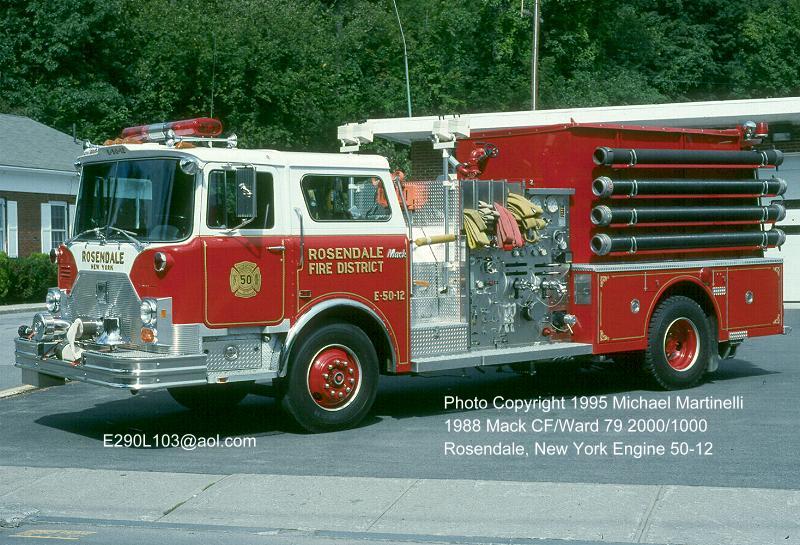
April 1 (10) 2025 Fire Chiefs Nick and Kris (both F, because, apologies, we can’t tell them apart on the recording) by Amanda(A) and Maria (M)
F: A lot of people come from an area where they have a career fire department. There are people that are in the firehouse 24/7. It’s just not the case in 85% to 90% of the fire departments across the United States. And people are really acutely aware of that. So a big push for us is to educate the public, let them know that we’re here and that it’s not a big deal to come down and say hello and inquire about being down here. So, we try to put the word out that we are welcoming. There’s no wall to come in or barriers for entry and anything like that. We’re here to serve and if anybody else is interested in that then you can be here with us.
A: What made you get into the fire department life or the firefighter life? Is your family?
F: No my family wasn’t. A lot of our members are multi-generational. In fact, currently serving active members right now we have one family that is a three generation family, all serving currently. For me, it was a long time ago. Not really sure! I’ve always been driven to serve, so once I became old enough, I was still in high school, I chose to see what it was all about.
M: Were you in Rosendale then?
F: Yes. I’ve been in Rosendale for a very long time. That’s what kind of pushed me to come down. It’s just kind of a little more curiosity: what is this all about? And, what do these guys do? I was welcomed. I haven’t looked back since. There’s always a striving for learning more. You can never learn enough. And there’s always more that’s on the table if you have the time for it – being able to choose different things at the state or the county offers to be able to learn different skills.
The firefighting of 20 years ago when I got here is different from the firefighting today. Building construction has changed drastically. You have some hundred plus-year-old homes right here on Main Street. And you have some brand new homes that are built completely differently. We have to know not only what are the risks involved with a hundred year old home are, but that’s completely different than a new build where things are, well, they say they don’t build things like they used to, right? And that holds through building construction as well. And we have to be wary of that when we’re entering a structure, whether it’s damage from storms, floods, or fire.
M: Are there some eras that are worse than others for the house ages?
A: I would imagine a lot of the ones on Main Street are like tinder boxes! I live in one!
F: What’s funny is you call it a tinder box. And from my experience, in any of the 70 plus-year-old homes that I’ve ever been in, including the house I grew up in, up on Mountain Road, you’ll see that it has burned at some point in the past, it was put out, and that house is still standing. You look close enough, you’ll find spots where houses have burned in the past. New build, if it burns, it’s gone to the ground!
M: Wow, interesting.
F: Whether it gets put out or not, it is probably going to get torn down. In fact, if you ever get the opportunity to look in the basement of St. Peter’s, I believe it had a pretty extensive fire in there. You can see if you look, the beams are charred and things like that.
A: Did you guys go to Bill Brooks’ postcard show at the theater the other night? It was amazing to see. First, it was a really cool show. If he does another one, I recommend it. But every postcard he’s like, “and then this building burned down. And then this one over here is gone too!”
A: So, what’s the process? Like, do you get a call and you come from your homes or your work?
F: Yeah, so the way Rosedale operates is that all of our members respond to the firehouse first. The reason for that is you’ll see other departments. Then you have accountability of equipment and things like that. Those members that are in those other departments, they carry the gear around in their car. The typical cost to outfit a firefighter is around $5,000 to $6,000.
A: Oh, my gosh.
F: We’re a separate entity from the town. The Rosendale Fire District is a separate taxing district. You’ll see a line item on your taxes, I believe for, per $100,000, our budget is $20 or something like that. It’s very minimal as far as fire tax.
M: Firehouses do lots of fundraisers too. What are those for?
F: So, inside the fire department, you’ll see, basically three different agencies. You have the fire district, which is our governing body. They handle the tax money. We report to the fire district, so you have operations, which is the fire department. We’ll handle our operations and then we’ll go to the fire district for “What do we need? What kind of new equipment do we need?” That’s all paid for. The fire department is what you’ll see a lot of times conducting those fundraisers. So the fire department or the firefighters association is who [supplies] things like a television, some couches, a nice area for the firefighters. Anything for firefighter comfort. Every now and then, it’s cool gear. We’ll buy them some new piece of gear or something like that. That’s all through fundraising. We’ll do fundraising for member welfare, almost it’s an incentive. People are volunteers. The generation that I grew up with, like some of the older generations, was “what can I do for everyone else?” My generation further on “is what can everyone else do for me?” So we have to find ways to incentivize people to be here.
A: That’s just how it is. It’s shifted.
F: I know when I was younger a lot of our evenings as young firefighters were spent here at the firehouse watching TV and spending time together. Playing pool or whatever – we have the space.
M: Camaraderie!
F: There’s also times where the fire department, through the fundraising, will do things to assist the district. What you’ll notice is, this entire side of the building on the other side of this wall and the entire back wall where they have, where we have our meetings was built by the firefighters through donations and they actually built that themselves.
M: Are you looking for people to do more fundraisers for you?
F: It’s probably a better question for the treasurer. Or the assistant chief.
A: So you guys, so it’s like 10 to 20 extra hours a week. That’s wild.
F: Yeah, for your active people, you have your meetings, your drills, your calls. Or, if you have a call, you end up cleaning all your things here. Yeah, the call is an hour, but then you’re here for an hour more cleaning everything. Two hours.
M: Well, do you guys need to eat here? There’s a big kitchen here. Who feeds you?
F: Depending on, what type of call it is or how long we’ve been here, the chiefs and our officers have a discretionary budget where we’ll order food. Some departments have a thing called a ladies auxiliary. So, a little outdated, but they do have an auxiliary department where they’ll call them in if they’ve been on a fire for a few hours and they’ll go down the firehouse and start cooking. We’ll bring them Gatorade and water and whatever else out to the scene of the fire, depending on how cold it is. Sometimes it’s coffee.
M: That’s something I feel like some people would be interested in helping out with.
A: What’s your relationship to the Bloomington Fire Department? Is it like a whole separate thing?
F: Yep. They’re completely different agency. We obviously work very closely with them. Any of the neighboring departments, we have to have a good relationship with them. Because of our personnel limitations, right? Again, there’s just less people in the town. There’s less people volunteering. So we all rely very heavily on each other. Most of the time, if anybody has any call of any type of significance, you’ll see three to four different departments from around the area, they’re assisting. It’s a thing called mutual aid, there is no expectation in place. It’s just that we’re all here to help. And, of course, when we can, we’ll help each other.
A: So regarding, say 30 years ago, your membership compared to today, how does it compare?
F: In the 80s, we were booming. In the 90s, it was probably been, you go up and down here and there, but overall, it stayed kind of steady over the last 20 years. But you lose a couple, might go the rest of that year for your body, but then you get a couple back and then you lose a couple. there’s a difference, even if it was the same exact amount of members, the cost of living in town and the cost of doing business, Most of our members, me as a good example, I work in Newburgh. Whereas most people would work in town or near town. There was actually more commercial business in town back then you had the pharmacy. You had the furniture store. You had a lot of “Fann’s” where that’s not really there anymore. And, what it takes to pay bills here. Most people aren’t living in town and working in town. We’ve had people that work over in Dutchess County. We have some people that work in the city. They take Trailways every day. You said like 20 something at the meeting every month in the 80s. In the past, we actually had four or five members that all worked for the town highway [department]. So you know they’re local. The town highway was also okay with them coming down here for a call. We had some members that were town police officers that, although they couldn’t come off the books as a police officer, they could at least assist in whatever way they could because they’re going to the same call anyway. That’s different now, we do still have some members that work in the area. Pete’s a prime example of it. Pete’s here a lot. Pete does a lot for us. But I work over in Newburgh. People pretty far out of the area that, even if we did get a call, for me coming from Newburgh is, I’ll be here in 40 minutes. It’s not going to be very much help.
M: The Rosendale Heart & Soul project is to have citizen empowered town planning, to really talk to everybody and find out what people want to do, what they want Rosendale to be, and ideas that they have for making Rosendale that town. And so we’re part of a national program that is guiding us, and towns across the United States have done this process. And the idea is that you reach out to people, you survey them, and you are important for us to survey because you have a perspective that other people in town don’t have. And so that’s kind of the next part of what we wanted to talk to you about is like, what do you love about Rosendale? What are your concerns for Rosendale and what ideas do you have for Rosendale?
F: I grew up here, right? Well, that’s a little bit false. I actually grew up on Mohonk, both of my parents work there at the hotel. They have employee housing. So I grew up there and moved down here. I must have been about 10. Since then, I’ve been in this area and a lot of nostalgia for me, those times where we’d all find somewhere to go, there’s always somewhere to explore. And the type of town it was then, where, if our parents didn’t know where we were, they didn’t have to worry about that. So a lot of ties to this town, the community. And a big part of the thing that still ties me here is this place. These people, what we try to build here [at the firehouse] is a separate family that’s still tied in to our own families. He’s got two of his children that are firefighters down here that I’ve known since they were my son’s age. My son’s four now. Having them down here and knowing them since then, we try to welcome everyone in and build that for everyone. Being a part of something like that is big. Being part of something bigger than your own world. And you learn a lot. Whether that’s about the fire service or just in general. You learn a lot about the area. There’s places that I’ve been here that I would never imagine. When I was just wandering around as a kid, you get to see some other things, different aspects of the town. You come to love the area and want to stick around. At least that’s for me.
M: How about you? What do you love about Rosendale?
F: Rosendale? Same thing. I mean, this is where my parents brought me home from the hospital and I never left. I moved a mile from my parents. It’s where my whole family is.
M: And have you been able to do okay here? Your family is thriving, it sounds like.
F: Yeah, I mean, nobody works in town, unlike the old days. I was one of them that worked in town for a while. Unfortunately, if you leave here, you make a lot more money. They don’t pay to keep people here. There are people that stay for their careers, whatever. But if you end up leaving, just to make more money to pay your mortgage, you still come home to here. It was a good community.
F: The same thing for me was growing up. [As a kid] you got kicked out of the house, you came back for dinner. We went wherever we wanted to go.
M: A lot of great places to go. I bet you knew all the swimming holes.
F: We knew a lot of places. You explored the woods, you explored, whatever. In turn, it works out good for this type of work because then, you know where to go when the person falls down the kiln and you have to go get them. You know what the hell they’re talking about.
A: That happened a few weeks ago, right? Was that in January? Was that you guys?
F: That was Bloomington station. I’ve dealt with them all during my time here. The rail trail is a challenging area for us, not a lot of access for large vehicles.
Everybody knew who you were. Like everybody knew everybody. You know Mrs. Jones, You know Mr. Smith, you know the entire neighborhood. That’s kind of changed now. And everybody talked to everybody. Now, you get people moving in, they don’t talk to you. They don’t wave to you. Those things. It is changing. Kind of sucks, but…
A: I interviewed somebody the other day who said the same thing.
F: Like, I’ve been in the neighborhood my entire life and my own house. I’ve been there for 20 plus years – which isn’t over, obviously. And you get people: “Hey, how are you?” Nothing.
A: Oh, like the people who move in next to somebody with beehives and then they’re like, no more beehives or no more chickens or…
F: See a lot of that. A lot across the United States. It’s a small microclimate here of that as well. “Wow, this place is great. I want to live here, but let me make it just like where I came from.” Well, we actually had a neighbor next door write a blog about us because she didn’t like us because the lights were on outside. And the sirens went off. Right.
M: Oh, I lived across the street from the Accord firehouse for 10 years. I know what that’s about, but every time the fire and the siren goes off, all you guys have got haul your butts out of bed and go there, and all I have to do is hear it.
F: And then, like, on Wednesday nights, every Wednesday we come down here and drill night for it. And sometimes other nights. Sometimes it’s just checking the equipment out front, but sometimes we’re doing drills outside, sometimes we’re drilling inside, sometimes we go somewhere else. People get home from work, eat dinner, come down. And they get done nine, ten o’clock a night and go back in trucks and they weren’t complaining. It doesn’t matter if you’re paid or you come down here for free. Fire doesn’t care. You’ll be stuck in your bedroom at two in the morning. Are you going to ask when we come in? “Are you a career firefighter?” You’re going to be happy that someone’s there. And our guys have to be trained at that same standard. Right. unfortunately, most of the time, it’s when we get home from work. So we’re down here at seven o’clock at night.
M: It’s amazing.
F: The siren does go off here. So, yeah, I mean, you’re talking about a very long time ago, that’s what let the firefighters know that they had to come down here. You had phone trees–they’d call each other. The technology has changed. They used to call the funeral home. The funeral home would then hit the siren button and activate it. Where was the funeral home? It was down the street. Oh, my gosh. They hit the siren button and then everybody would hear the siren and the firemen would then come down for a call.
Now we upgraded to pagers. That worked pretty well. We still use them. And then nowadays they have apps, but the apps don’t always work. Like, because that all goes through text messaging and stuff. So sometimes when it’s real busy, it storms or something, the apps don’t work. On a general day, they work pretty good. But there’s sometimes when I’m out doing yard work and you hear the siren. It’s more reliable.
F: Well, I would hope the town is reasonable, so that the rest of the family can stay here. And that’s one of the big things that a lot of guys have left. One for jobs or school. A lot of kids go to school and they end up somewhere. But other ones have moved out by the town because it’s cheaper two towns over. I’d like to see my kids stay here. But it is expensive. There’s no land anymore. My neighbor’s house– so they came up and paid $300,000 for it. It’s probably worth $100. Nice lady. She sold her a place in the city and it’s probably for $800,000, you know. So it’s nothing for them to come up and pay for 900 square feet.
F: My wife is peeling me away from the town. I can sell mine and go somewhere. I’m going to get cheape. Rent’s outrageous, too. Some of that’s in the taxes. Some of that, too, I feel is because the houses are selling for so much, and she buys the house now she wants to rent it because she paid so much, she has to charge that much to cover the mortgage.
M: We have been hearing that RUPCO is going to be building some housing locally, hopefully. We’ll see how that happens.
A: We heard a rumor, maybe St. Peter’s, the school there might get turned into housing. We’ll see.
F: I heard the rumor, too. I don’t know how feasible it is. I mean, you’re going to get, like, eight apartments in there. That creates a big problem for us, because now we have to change our whole system, and that’s taxpayers’ money. We’ll have to look at ladder trucks, which we avoid.
M: No kidding!
F: Which we probably possibly should have had many years ago anyway, because of some of the buildings. But, now you’re talking nowadays, $2,000,000 minimum for ladder trucks. So this truck right here, that’s a 2001 that costs us $210,000? We looked at replacement, and we were quoted at $980,000. That was over a year ago though. Yep. So now it’s probably over a mill. Just for a regular truck. Just that one there. So a ladder truck used to be about a million, and now they’re $2 million. But it also takes four years to get one.
M: Is it because there are so many more fires now?
F: No, I would say there’s actually fewer fires than in the past. The technology as far as building has changed the types of things that were less fires, but if there is a fire, it’s just more dangerous.
M: Yeah, I guess I’m thinking of all the wildfires that have been happening lately. You guys have to go to those too, right?
F: There is specialized equipment involved with that as well. So we have to be a jack of all trades, or we have local departments that have more resources in that department than we do. And we try to supplement them and things that we have that they don’t have. So one thing, like some departments have ATVs with water on them to get into some of the areas like the rail trail that had a fire. And we’re not getting a fire engine down the rail trail. So they’ll have smaller trucks that are capable of carrying water into smaller locations like that. So we try to supplement each other.
M: The complexity is amazing. It never even occurred to me.
F: One thing I always say, when Bill Brooks approached me and he was doing the postcard show: “Oh, we want to donate some proceeds.” I’m not going to say no! So if people are interested in funding or trying to help out, of course we don’t want to turn that down. To an extent, anything that we get from the community, we’re using it to better serve the community. Whether that is with firefighter morale and enticing people to come down and volunteer, or if it’s with buying equipment that they can use to help. Whether it’s putting an addition on the firehouse because we need more room. We’ve always tried to take that money and reinvest it into the community or the way that we serve the community. So from the outside it looks like we’re just in here, “a million dollars for a fire truck you guys are in there just wasting money.” No, we’re very concerned about fiscal responsibility and trying to do the best we can. And sometimes it is balancing “Well, we need a new one of these,” but can we make it work? A lot of times you look for donations for things like buying equipment. And people, well, “I already pay my fire tax. You want me to pay more?” Well, I mean, it’s understandable. People’s bills are high. We talked about the cost of living and how hard it is to get by. And, it’s hard to ask for more. So, of course, we’ll take it and we’ll be very happy and do our best. But at the same time, we don’t expect it at all.
A: We were talking in the beginning about ways that people can volunteer without going into a fire. I mean, go into a fire if you want to. But could you just say for the record a few things that people could do.
F: Absolutely. So we have different types of members. A lot of people do different things. Some of our members are solely EMTs or emergency medical technicians. We respond to medical calls. What’s considered an “ALS” or advanced life support call, we get dispatched too. Those are critical care calls. Anything to do with the heart, any type of trauma, things like that. The sprained ankles and the more minor things we won’t get dispatched to. It’s the more advanced stages that we get sent to. But we have our basic emergency medical technicians that will respond to those calls and assist the ambulance company in treating patients. We have firefighting interior scene support. They just assist on the scene. Whatever our interior firefighters, interior being people that go into the fire, they’re just there to help them. Whatever they may need. Dry clothes, get equipment off the truck. We have one specifically, she’s also an EMT, but she’ll chase everybody around with a case of water. And you need to drink this, right? Because a lot of times, myself included, you get so focused on the task at hand that you start to not take care of yourself as well. So we have people that are strictly just watching out for our health and safety. Every scene gets what’s called a safety officer, where their job, they can override the chiefs. If they see something that’s unsafe, or that could be unsafe, they stop everything and make sure that our attention is called to it. Because we can’t be everywhere at once. We have, like, your senior guys, or past chiefs or something, that could get stuck with that task. A lot of our senior members, they’re not as physical anymore, but they’re still capable of coming down and helping, so they’ll drive the truck for us. That frees up one of our younger members to be able to do more work. Somebody has to be with the truck at all times on the scene. Especially to see that the truck’s pumping water has to be monitored. Because if it stops pumping for any reason, then the people inside are in danger, because they don’t have water. So the truck gets constantly monitored. More demanding job. Very mentally demanding, for sure. Yeah, you’ve got to monitor water coming in, where it’s going out. More of the different air(?) lines going, shut them off and turn them off. Make sure you have enough water from another source if we don’t. We’re lucky we have some hydrants here, but on the outskirts we don’t. So we have to truck it in.
A: You can fill up down this block, right?
F: Over by the church. We do require people to take the admin on the basic course. We encourage everybody to take the fire fighter one for interior stuff and the exterior course, which is, I don’t know, the whole, the whole kit in the bootle is 129 hours now. But the exterior one, they can separate it. I think that one’s like 70 something. It’s difficult to ask people to attend that level of training, right? You’re asking people to, 129 hours is a whole long time. The county has done a good job of offering different and the state different types of courses. I know when I took these courses, my original firefighting certifications, I was still in high school. So two nights a week, I’d be down here for three or four hours, take the classes and then go to school the next day. That’s difficult for people that work, have families, again, I have a four year old right now. You want me to give you 130 hours, it’d be tough. I think I can make it happen, but it’d be a lot harder for me than when I was in high school. But they also offer now for a lot of people, if they can afford to get the time off from work, the county has now started offering a two week boot camp program where they take their course every day for two straight weeks. So a lot of different opportunities, your options for training and the way to complete it. They also break up the courses so you can take a little bit this year and just finish it off the following year. And then you can just either roll right into it, or it’ll be even wait a little bit. But even if you just get that first basic one in, then you can just look for the interior ones.
A: And if people want more information in order to talk to you, how can they reach you?
F: Wednesday nights, we’re down here. If you drive by and the doors are open and there’s cars here, somebody can just stop in, say hello. They’ll point you in the right direction if they can’t figure it out on their own.

